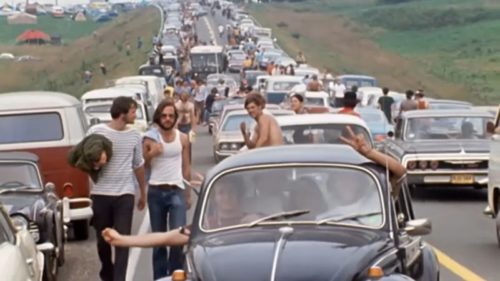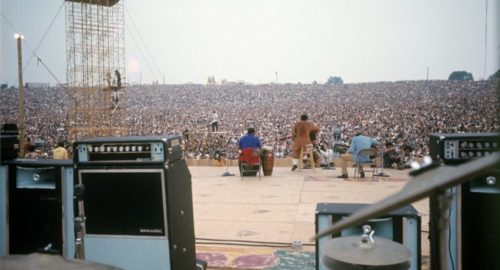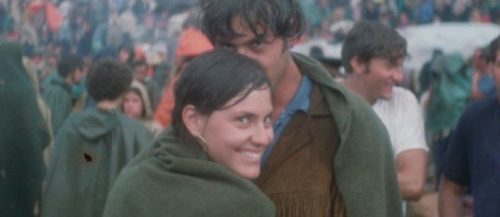Woodstock. Ever hear of it? Big concert? 1969? Hendrix? Guthrie? Sha Na Na? No? Made something of a splash at the time. And it’s been splashing ever since. But even though it feels like there must be a hundred documentaries about the festival, it’s more that it’s been mentioned in a thousand of them. It’s become a concept more than an actual event. All by itself it manages to stand in for “hippies,” “the ‘60s,” “drugs,” “rock an roll,” and any combinations thereof.
The most famous document of the event is Michael Wadleigh’s 1970 film, Woodstock (edited by, among others, Martin Scorsese and Thelma Schoonmaker), which focuses on the performances.
Director Barak Goodman’s new doc, Woodstock: Three Days that Defined a Generation, is a history of the event, of the organizers, of the attendees, with only the briefest musical snippets thrown in to set the scene. The bulk of the footage comes from what Wadleigh’s original crews shot wandering around the massive crowd, much of which was locked away in the Warner Brothers vault and is seen here for the first time since.

Wisely, there are no shots of talking heads in the new movie. Only the voices of those who put on the festival and those who attended playing over footage from the era, effectively placing one in ’69, in the mud and the music, undistracted by aging hippies in their living rooms remembering the good old days.
It’s an entertaining documentary, even if a fair amount of it feels familiar. Goodman’s thesis, as stated in the title, is that Woodstock defined a generation. His movie is designed to explain why and how. In that, it’s not a documentary pretending to be objective. It exists to make an argument: That the bringing together of close to half a million people in a field in New York with no violence, with no security aside from members of Wavy Gravy’s hog-farm commune, where despite countless organizational clusterfucks people pulled together to help one another, epitomized the hippie ideal of community, peace, and love.
In that, the movie is a bit starry-eyed. One has to assume that some attendees have less positive memories of the festival. They are not interviewed. Or, then again, what do I know? Maybe it was as universally beloved by all who attended as Goodman suggests. In light of current cultural disasters like the Frye Festival, it’s a wonder to see something so poorly planned and so poorly executed come together so successfully (experientially, at any rate). Not even the locals were upset being overrun by hippies. When the festival runs out of food, they empty their pantries to feed the hungry kids. Starry-eyed the film may be, but people really did pull together in the face of a logistical trainwreck in ways you don’t expect among hungry, muddy, tripping thousands.

Some irony still sneaks in, like hearing interviewees express their wonder at how peace and love prevailed over shots of the Monday afternoon festival grounds covered in tons and tons of abandoned garbage. Nature-loving hippies they may be, but they’re still human, aren’t they? Throw their shit everywhere and figure somebody else will clean it up.
In showing how Woodstock worked despite all it was up against, the movie is a success. What it isn’t able to explain is why it was the event it was. As the movie reminds us, other large music festivals of the era, both before and after Woodstock, were beset by violence and other miseries. Why did Woodstock come off so peacefully? Goodman doesn’t really provide an answer. Implicit is that it was because the hippies were the hippies, and here they were en masse. But that doesn’t explain why no other Woodstock-like concerts were like Woodstock (aside, maybe, from the one that started the trend, Monterey Pop in ’67). Woodstock defined a generation, then, because it was the biggest, because by most practical measures it was a disaster, and because it nevertheless came off with nothing but peace-loving hippie vibes. And it didn’t hurt that the music was fantastic.


The movie The Car is Awesome. Just saw on MeTV from Stevengoolie. James Brolen looks great. Lite Horror. Loved it! Liked your review.